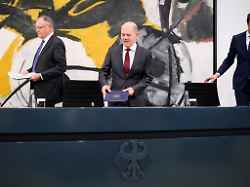updates
Housing allowance and 9-euro ticket open
Federal-state summit adjourns controversial points
10/04/2022, 9:50 p.m
With a 200 billion package, the traffic light wants to relieve the citizens in the face of horrendous energy prices. How the costs should be divided between the federal and state governments remains controversial after the summit in the Chancellery. Even in details there is no breakthrough. The heads of the Union countries in particular have expressed their disappointment.
The federal and state governments have not yet reached a consensus on how to distribute the costs of relieving the burden on citizens and companies in view of the high energy prices. “There are still discussions about how this can be shouldered in detail,” said Federal Chancellor Olaf Scholz after four hours of consultations with the prime ministers of the federal states in Berlin. “But I have the impression that we are on a very constructive path and that we will also come to an agreement about this task.”
NRW Prime Minister Hendrik Wüst, on the other hand, accused the federal government of showing “hardly any willingness to compromise”. “We’ve only made a few steps forward today and we’re still a long way from reaching our goal.” From the point of view of many countries, this is simply not enough, according to the CDU politician.
Scholz calculated that the previous relief packages and the special fund now planned will have a total volume of 295 billion euros. “The federal government will take on and finance almost 240, 250 billion euros of this,” said the Chancellor. According to him, the concrete design of the planned electricity and gas price brake is still being discussed.
The federal government wants to protect consumers and companies from high energy prices due to the Ukraine war with a package of measures worth up to 200 billion euros. Gas and electricity prices should be capped. There should be liquidity and equity support for companies. Details are still open. The aid is to be financed through loans. The consultations also included a solution to replace the 9-euro ticket for local and regional transport that expired at the end of August.
Kretschmann “very disappointed”
The Prime Minister of Baden-Württemberg, Winfried Kretschmann, was very disappointed with the results of the federal-state meeting with Scholz. “I would have hoped that we would put a button on it, but unfortunately that didn’t happen,” said the Greens politician in the US city of Pittsburgh. The states are too far apart from the federal government on individual issues.
So you couldn’t agree on the question of a “cheap ticket” for local transport, said Kretschmann. It makes no sense to introduce a cheap ticket if the federal states have to cancel trains at the same time because they do not receive any so-called regionalization funds from the federal government. Next week it will be clarified whether there will be an agreement. By the end of the month, it should also be clarified how the federal government will contribute to the refugee costs.
Kretschmann said it was agreed that there would be a noticeable reduction in gas prices. Electricity prices would follow suit. There was agreement that companies, institutions and citizens would be noticeably relieved. However, it has not yet been possible to agree on other things because the design of the gas price brake depends on whether further aid is required for companies or hospitals, for example. This must then be clarified quickly.
No solution for the 9 euro ticket
Kretschmann named money for hospitals, housing benefit and the assumption of refugee costs as central points of conflict. The Green politician is currently on a delegation trip to the USA and has been connected digitally to the federal-state group from Pittsburgh in the US state of Pennsylvania. In the past few weeks, he had repeatedly insisted on more money from the federal government – including for local rail transport in the federal states.
The 9-euro ticket has brought considerable relief in metropolitan areas, but not in many rural areas where there is not such a good offer, Lower Saxony’s head of government Stephan Weil from the SPD. Weil has to pass a state election next Sunday and, unlike Wüst, was satisfied with the consultations, which he called “very constructive”. It was clear from the beginning that this could not be the final deliberation.
One must continue to work on an agreement, said the chairman of the conference of prime ministers, Lower Saxony’s head of government Stephan Weil from the SPD, after the consultations in Berlin. But other country heads drew a similarly negative balance as Wüst. “In my view, the negotiations today with Chancellor Olaf Scholz were a disappointment,” said Hesse Prime Minister Boris Rhein from the CDU. Schleswig-Holstein’s Prime Minister Daniel Günther – also CDU – complained that the federal government could not answer any of the now important questions. “In view of the really difficult situation we are in in Germany, with great uncertainty among the population, I would have expected the federal government to go into this conference with much more concrete ideas.”
